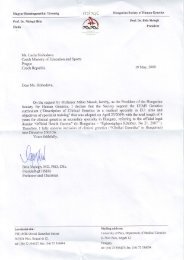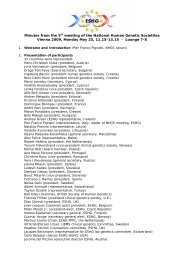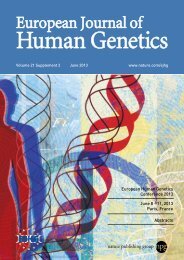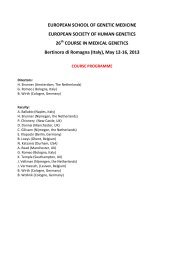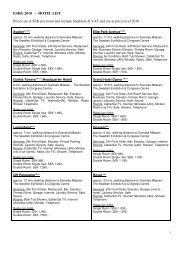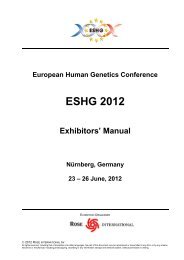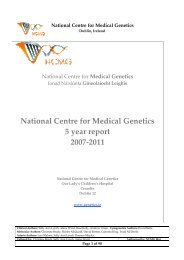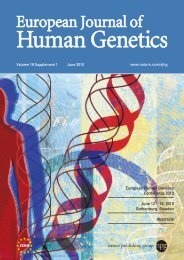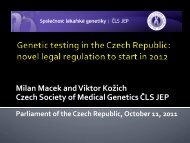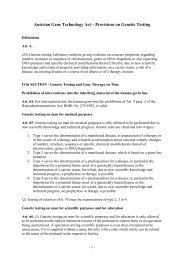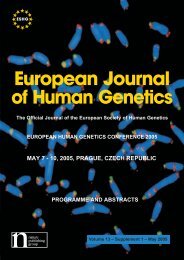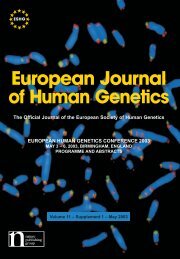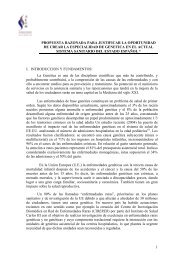2008 Barcelona - European Society of Human Genetics
2008 Barcelona - European Society of Human Genetics
2008 Barcelona - European Society of Human Genetics
You also want an ePaper? Increase the reach of your titles
YUMPU automatically turns print PDFs into web optimized ePapers that Google loves.
EMPAG Posters<br />
there is not a corresponding word in their given language . Interviews<br />
consisted <strong>of</strong> standard questions as well as an exploration <strong>of</strong> generally<br />
held beliefs about inheritance, and how decisions are made in the<br />
family culture .<br />
A review <strong>of</strong> the questionnaire and the outcomes <strong>of</strong> these interviews<br />
will be discussed .<br />
EP10.19<br />
the genealogical tree is a very important stage in genetic<br />
counseling <strong>of</strong> the families with mentally retarded children<br />
I. Tomulescu1 , H. Vaida2 , M. Marian2 , G. Roseanu2 ;<br />
1 2 Faculty <strong>of</strong> Sciences, Oradea, Romania, Faculty <strong>of</strong> Socio-<strong>Human</strong> Sciences,<br />
Oradea, Romania.<br />
In humans, some traits are abnormal and they have diverse etiologies .<br />
Certain traits appear isolated in a person and others appear associated<br />
in a diseases called syndromes .<br />
To make a pedigree <strong>of</strong> an individual or a family, it’s a necessity to<br />
gather data about the family or individual . We investigated 600 children<br />
hospitalized on period <strong>of</strong> 2000-2002 in Neuropsychiatric Infantile<br />
Section <strong>of</strong> Neurology and Psychiatry Clinical Hospital from Oradea .<br />
Results and discussions<br />
In 600 children that were examined, 397 presented different levels <strong>of</strong><br />
mental deficiency. We made family investigations and genealogical<br />
tree .<br />
More than 65% <strong>of</strong> children with mental deficiency have one or more<br />
affected relatives in family . The relatives may be affected by congenital<br />
abnormalities and/ or mental diseases . The incidences <strong>of</strong> affected<br />
relatives are important in groups with mild and moderate mental deficiency.<br />
In the group with severe mental deficiency, the incidence <strong>of</strong><br />
affected relatives is lower .<br />
This result may be an argument for the hypothesis that genetic factors<br />
are very important in the inheritance <strong>of</strong> mental deficiency. It seems<br />
that, elementary, severe mental deficiency appears because <strong>of</strong> genes<br />
and chromosomes disorders, and secondary because <strong>of</strong> dominant<br />
or recessive inheritance . The data about family are systematized in<br />
pedigree or genealogical tree <strong>of</strong> the family . Analysing the pedigree <strong>of</strong><br />
a family, we can say that some traits are inherited or not . Also, we can<br />
anticipate some normal or abnormal traits <strong>of</strong> individuals <strong>of</strong> the next<br />
generation .<br />
EP10.20<br />
Psychological and familiar impact <strong>of</strong> genetic diagnisis in<br />
oculopharyngeal muscular dystrophy<br />
M. Fernández-Prieto 1 , M. J. Sobrido 1,2 , B. Quintáns 3,2 , F. Barros 1,2 , J. L. Castro<br />
1 , J. Pardo 4 , A. Carracedo 1,2,5 ;<br />
1 Fundación Pública Galega de Medicina Xenómica, Santiago de Compostela,<br />
Spain, 2 Centro de Investigación en Red de Enfermedades Raras (CIBERER),<br />
ISCIII, Santiago de Compostela, Spain, 3 Hospital Clínico de Santiago-SER-<br />
GAS, Santiago de Compostela, Spain, 4 Servicio de Neurología-Hospital Clínico<br />
de Santiago de Compostela, Santiago de Compostela, Spain, 5 Grupo de Medicina<br />
Xenómica-USC, Santiago de Compostela, Spain.<br />
Oculopharyngeal muscular dystrophy (OPMD) is a late-onset, slowly<br />
progressive muscular disease . Inheritance is autosomal dominant;<br />
penetrance is full, age-dependent . Symptoms are paresis <strong>of</strong> extraocular<br />
eye muscules, dysphagia and limb weakness . Because it is not<br />
considered a very disabling disorder and molecular diagnosis is simple<br />
- making it easily accessible to almost any laboratory- testing may be<br />
requested without much concern about psychological and social aspects<br />
. Psychological and familiar impact <strong>of</strong> this diagnosis has not been<br />
tackled . Out <strong>of</strong> 76 patients with suspected OPMD seen in our unit, 45<br />
(29 families) were positive . In families referred for genetic counselling<br />
we carried out a psychological evaluation with a semi-structured indepth<br />
interview analyzing motivations, attitude and anxiety . We found<br />
an average <strong>of</strong> 1 .8 secondary cases (symptomatic or asymptomatic) per<br />
index case . 82 % <strong>of</strong> predictive analyses were positive . We received no<br />
requests for antenatal diagnosis . Twelve months after genetic testing<br />
another psychological exam was done using HAD and a semi-structured<br />
in-depth interview to assess personal and familiar impact <strong>of</strong> the<br />
diagnosis. Although molecular confirmation <strong>of</strong> OPMD did generally not<br />
cause serious distortion in psychological aspects or in the familiar core,<br />
some aspects <strong>of</strong> family life were indeed modified. Even if not perceived<br />
as a severe disease in their relatives, for many individuals the possibility<br />
<strong>of</strong> a predictive diagnosis caused significant stress. A protocol for<br />
genetic counselling and psychological assessment are fundamental in<br />
this disease . Reasons for the low proportion <strong>of</strong> secondary cases may<br />
be multiple and should be further investigated in the future .<br />
EP10.21<br />
sense making in Predictive Genetic testing <strong>of</strong> Hereditary<br />
cancer. An interview study<br />
E. Sumalla1,2 , C. Ochoa1 , R. Martinez1 , C. Yague1 , M. Salinas1 , I. Blanco1 ;<br />
1 2 Genetic Counseling Unit, L’Hospitalet, Spain, Fundació P Gastroenterologia<br />
Dr. Vilardell, <strong>Barcelona</strong>, Spain.<br />
Purpose: Mankind involves an active effort to find a purpose in the<br />
events that surround us . This construction <strong>of</strong> meaning is a process<br />
that is reinforced with stressful events that may be inconsistent with<br />
our beliefs about when and why things happen . The aim <strong>of</strong> this study<br />
was to evaluate, from a narrative perspective, how biographical factors<br />
may contribute to the formation <strong>of</strong> different meanings <strong>of</strong> the genetic<br />
diagnosis .<br />
Methods: Three pairs <strong>of</strong> siblings (n = 6) identified as carriers <strong>of</strong> a genetic<br />
defect were evaluated using semi-structured interview designed<br />
to identify vital changes associated with the process <strong>of</strong> genetic counseling<br />
. Three independent researchers conducted content analysis<br />
and identified significant differences between each pair <strong>of</strong> interviews<br />
by consensus .<br />
Results: In pair <strong>of</strong> siblings A, the presence <strong>of</strong> other stressful events<br />
minimize the potential harmful <strong>of</strong> the genetic diagnosis experienced by<br />
one <strong>of</strong> the brothers; in pair B, the relationship with a very affected close<br />
relative encourages active coping problem with one <strong>of</strong> the members;<br />
and in C, the concept <strong>of</strong> brotherhood and sacrifice allow one <strong>of</strong> the<br />
sisters assume their genetic alteration as an opportunity to increase<br />
their family privacy .<br />
Conclusions: Despite sharing diagnosis, family history <strong>of</strong> cancer and<br />
genetic counseling process, the narratives <strong>of</strong> the siblings presented<br />
significant differences between them. The use <strong>of</strong> different frameworks<br />
<strong>of</strong> interpretation according to the biography <strong>of</strong> each subject provides<br />
the genetic diagnosis <strong>of</strong> sense and different consequences .<br />
EP10.22<br />
Delivering genetic counselling via telehealth: practitioner‘s<br />
experience <strong>of</strong> a virtual consultation<br />
E. M. Zilliacus 1,2 , B. Meiser 1,3 , E. A. Lobb 4,5 , J. Kirk 6 , A. Spigelman 7 , K. Barlow-<br />
Stewart 8 , L. Warwick 9 , K. Tucker 10 ;<br />
1 Psychosocial Research Group, Randwick, Australia, 2 School <strong>of</strong> Psychiatry,<br />
University <strong>of</strong> New South Wales, Randwick, Australia, 3 Prince <strong>of</strong> Wales Clinical<br />
School, University <strong>of</strong> New South Wales, Randwick, Australia, 4 Medical Psychology<br />
Research Unit, Sydney, Australia, 5 WA Centre for Cancer & Palliative Care,<br />
Perth, Australia, 6 Familial Cancer Service, Westmead, Australia, 7 Hunter Family<br />
Cancer Service, Newcastle, Australia, 8 Centre for Genetic Education, Royal<br />
North Shore Hospital, St Leonards, Australia, 9 ACT Genetic Service, Woden,<br />
Australia, 10 Department <strong>of</strong> Medical Oncology, Randwick, Australia.<br />
Telehealth, or videoconferencing, is an evolving field in general and<br />
cancer genetics . The aim <strong>of</strong> this study was to qualitatively explore clinicians’<br />
perspectives and experiences <strong>of</strong> delivering telehealth genetic<br />
counselling . Semi-structured interviews were conducted with geneticists<br />
and genetic counsellors . The interviews explored experience,<br />
satisfaction, aims <strong>of</strong> the service, advantages and disadvantages <strong>of</strong><br />
the technology, and roles within the consultation . RESULTS: Fifteen<br />
practitioners participated . They reported that telegenetics increased<br />
staff efficiency and accessibility to outreach clinics. The geneticists<br />
presented as the consulting specialist, delivering medical information<br />
and screening advice and depended more on the genetic counsellor to<br />
assess non-verbal behaviour and subtle emotional cues from the client<br />
. Consultations were described as being more formal, and possibly<br />
less open to emotional expression than face-to- face consultations . Interactions<br />
on-screen were moderated by the physical positioning <strong>of</strong> the<br />
genetic counsellor and client . When the counsellor was positioned “<strong>of</strong>f<br />
screen”, a medically modelled dyadic interaction occurred and nonverbal<br />
cues between the counsellor, the geneticist and the client were<br />
obscured . When positioned “on screen”, counsellors reported they <strong>of</strong>fered<br />
a higher level <strong>of</strong> psychosocial support before, during and after<br />
the telehealth session .<br />
Practitioners were highly satisfied with telegenetics but acknowledged<br />
the trade <strong>of</strong>f involved in the geneticist not being physically present .<br />
The technology is efficient and <strong>of</strong>fers sufficient resolution to attend to



